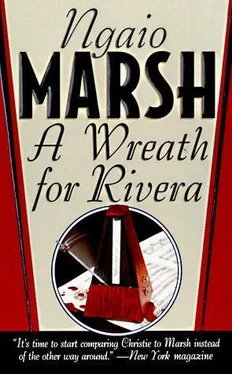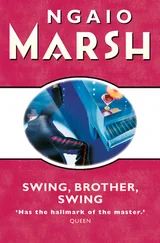“Good Lord, C,” he rejoined, “what’s the matter with bein’ searched? Trouble with you is you’ve got a dirty mind. If you’d listened to my talks on the Body Beautiful that time in Kent…”
“ Silence !” she said (in French) and swept into the ladies’ cloakroom. Félicité giggled nervously.
“Anybody may search me ,” Lord Pastern said generously. “Come on.”
He led the way to the men’s cloak-room.
Alleyn said: “Perhaps, Miss de Suze, you would like to go with your mother. It’s perfectly in order, if you think she’d prefer it.”
Félicité was sitting in her chair with her left hand clutching her bag and her right hand out of sight. “I expect she’d rather have a private martyrdom, Mr. Alleyn,” she said.
“Suppose you go and ask her? You can get your part of the programme over when she is free.”
He stood close to Félicité, smiling down at her. She said, “Oh, all right. If you like.” Without enthusiasm, and with a backward glance at Manx, she followed her mother. Alleyn immediately took her chair and addressed himself to Manx and Carlisle.
“I wonder,” he said, “if you can help me with one or two routine jobs that will have to be tidied up. I believe you were both at the dinner party at Lord Pastern’s house — it’s in Duke’s Gate, isn’t it? — before this show to-night.”
“Yes,” Edward said. “We were there.”
“And the rest of the party? Bellairs and Rivera and of course Lord and Lady Pastern. Anyone else?”
“No,” Carlisle said and immediately corrected herself. “I’d forgotten. Miss Henderson.”
“Miss Henderson?”
“She used to be Félicité’s governess and stayed on as a sort of general prop and stay to everybody.”
“What is her full name?”
“I–I really don’t know. Ned, have you ever heard Hendy’s Christian name?”
“No,” Edward said. “Never. She’s simply Hendy. I should think it might be Edith. Wait a moment though,” he added, “I do know. Fée told me years ago. She saw it on an electoral roll or something. It’s Petronella Xantippe.”
“I don’t believe you.”
“People so seldom have the names you expect,” Alleyn murmured vaguely. “Can you give me a detailed description of your evening at Duke’s Gate? You see, as Rivera was there, the dinner party assumes a kind of importance.”
Carlisle thought: “We’re waiting too long. One of us ought to have replied at once.”
“I want,” Alleyn said at last, “if you can give it to me, an account of the whole thing. When everybody arrived. What you talked about. Whether you were all together most of the time or whether you split up, for instance, after dinner, and were in different rooms. That kind of thing.”
They began to speak together and stopped short. They laughed uncomfortably, apologized and invited each other to proceed. At last Carlisle embarked alone on a colourless narrative. She had arrived at Duke’s Gate at about five and had seen her aunt and uncle and Félicité. Naturally there had been a good deal of talk about the evening performance. Her uncle had been in very good spirits.
“And Lady Pastern and Miss de Suze?” Alleyn said. Carlisle replied carefully that they were in much their usual form. “And how is that?” he asked. “Cheerful? Happy family atmosphere, would you say?”
Manx said lightly: “My dear Alleyn, like most families they rub along together without — without — ”
“Were you going to say ‘without actually busting up’?”
“Well — well — ”
“Ned,” Carlisle interjected, “it’s no good pretending Uncle George and Aunt Cécile represent the dead norm of British family life. Presumably, Mr. Alleyn reads the papers. If I say they were much as usual it means they were much as usual on their own lines.” She turned to Alleyn. “On their own lines, Mr. Alleyn, they were perfectly normal.”
“If you’ll allow me to say so, Miss Wayne,” Alleyn rejoined warmly, “you are evidently an extremely sensible person. May I implore you to keep it up.”
“Not to the extent of letting you think a routine argument to them is matter for suspicion to you.”
“They argue,” Manx added, “perpetually and vehemently. It means nothing. Well, you’ve heard them.”
“And did they, for example, argue about Lord Pastern’s performance in the band?”
“Oh, yes,” they said together.
“And about Bellairs or Rivera?”
“A bit,” said Carlisle after a pause.
“Boogie-woogie merchants,” Manx said, “are not, in the nature of things, my cousin Cécilc’s cups of tea. She is, as you may have noticed, a little in the grande dame line of business.”
Alleyn leant forward in his chair and rubbed his nose. He looked, Carlisle thought, like a bookish man considering some point that had been raised in an interminable argument.
“Yes,” he said at last. “That’s all right, of course. One can see the obvious and rather eccentric mise en scène . Everything you’ve told me is no doubt quite true. But the devil of it is, you know, that you’re going to use the palpable eccentricities as a sort of smoke screen for the more profound disturbances.”
They were astonished and disconcerted. Carlisle said tentatively that she didn’t understand. “Don’t you?” Alleyn murmured. “Oh, well! Shall we get on with it? Bellairs has suggested an engagement between Rivera and Miss de Suze. Was there an engagement, if you please?”
“No, I don’t think so. Was there, Lisle?”
Carlisle said that she didn’t think so either. Nothing had been announced.
“An understanding?”
“He wanted her to marry him, I think. I mean,” Carlisle amended with heightened colour, “I know he did. I don’t think she was going to. I’m sure she wasn’t.”
“How did Lord Pastern feel about it?”
“Who can tell?” Edward muttered.
“I don’t think it bothered him much one way or the other,” Carlisle said. “He was too busy planning his début.”
But into her memory came the figure of Lord Pastern, bent over his task of drawing bullets from cartridges, and she heard again his grunted: “much better leave things to me.”
Alleyn began to lead them step by step through the evening at Duke’s Gate. What had they talked about before dinner? How had the party been divided, and into which rooms? What had they themselves done and said? Carlisle found herself charged with an account of her arrival. It was easy to say that her aunt and uncle had argued about whether there should be extra guests for dinner. It was not so easy when he led her back to the likelihood of an engagement between Rivera and Félicité, asking if it had been discussed and by whom, and whether Félicité had confided in her.
“These seem impertinent questions,” Alleyn said, and anticipated her attempt to suggest as much. “But, believe me, they are entirely impersonal. Irrelevant matters will be most thankfully rejected and forgotten. We want to tidy up the field of inquiry, that’s all.” And then it seemed to Carlisle that evasions would be silly and wrong and she said that Félicité had been worried and unhappy about Rivera. She sensed Edward’s uneasiness and added that there had been nothing in the Félicité-Rivera situation, nothing at all. “Félicité makes emotional mountains out of sentimental mole-hills,” she said. “I think she enjoys it.” But she knew while she said this that Félicité’s outburst had been more serious than she suggested and she heard her voice lose its integrity and guessed that Alleyn heard this too. She began to be oppressed by his quiet insistence and yet her taste for detail made her a little pleased with her own accuracy, and she felt something like an artist’s reluctance to slur or distort. It was easy again to recall her solitary time before dinner in the ballroom. As soon as she began to speak of it the sensation of nostalgia flashed up in her memory and she found herself telling Alleyn that her coming-out ball had been there, that the room had a host of associations for her and that she had stood there, recollecting them.
Читать дальше






